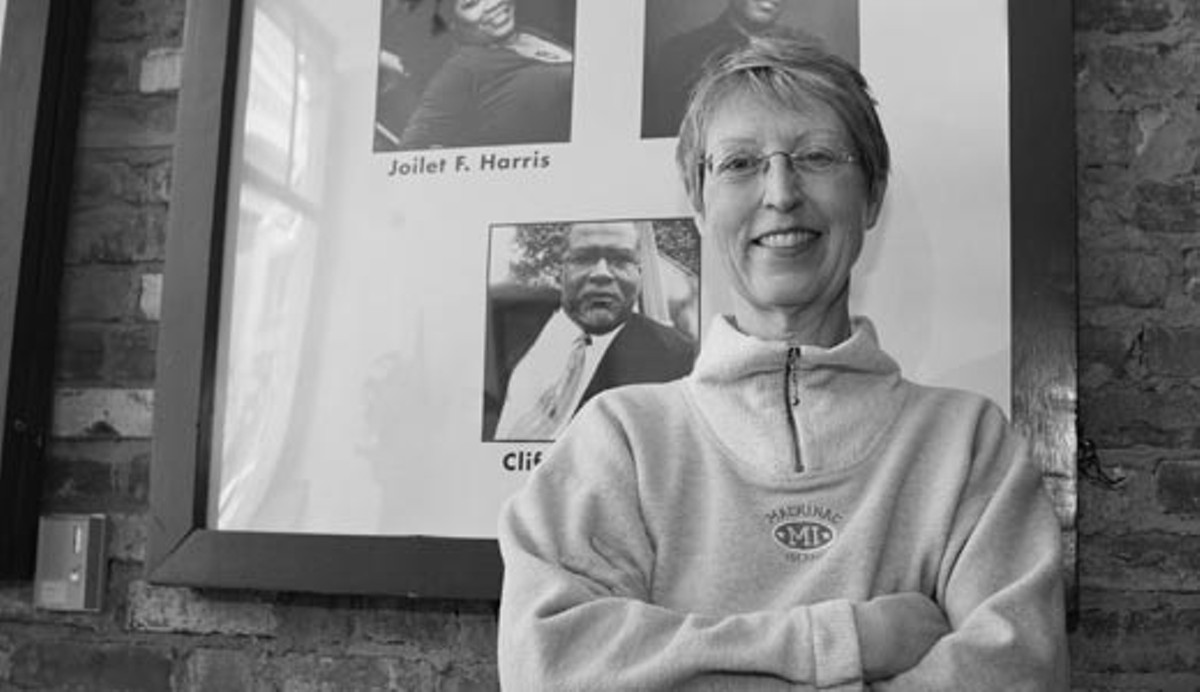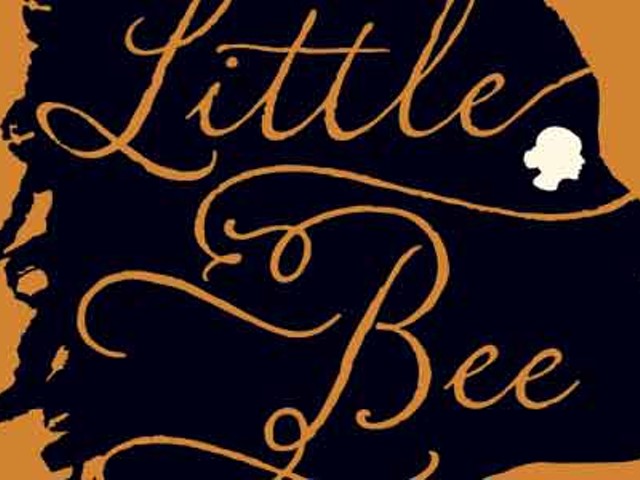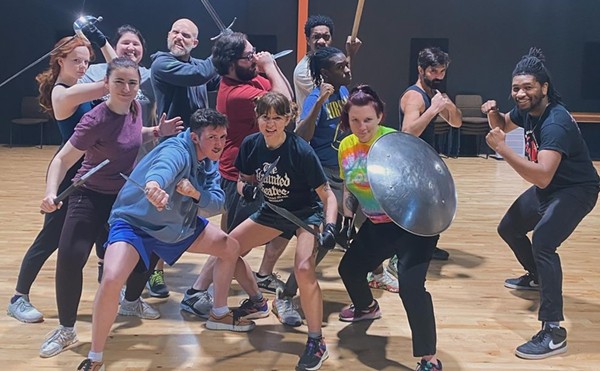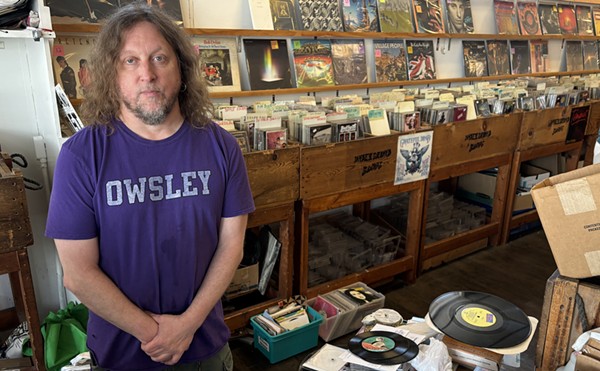For a quarter century, Zan Sawyer-Dailey has been transforming words on a page into bodies on a stage. As associate director at Actors Theatre of Louisville, she has a varied portfolio that includes education and outreach, coordination of apprentice and intern training, and company management. But she also is responsible for casting — a job requiring the vision of an artist, the organizational skills of an engineer, and the people skills of a diplomat.
Sawyer-Dailey has spent her life in the theater. After a career as a child actor in Chicago, she studied at Butler University, earned a scholarship to study theater in London, worked at Houston’s prestigious Alley Theatre, earned an MFA at Florida State University in what was then the new field of Arts Administration, and came to Louisville 25 years ago.
In the midst of final preparations for this year’s Humana Festival of New American Plays, she took time to give LEO Weekly the inside scoop on what’s involved in casting what amounts to an entire season — seven full-length plays, plus a program of 10-minute plays — compressed into a single month.
LEO: How many roles did you cast for this year’s Humana Festival?
Zan Sawyer-Dailey: This year the festival has 42 performers, plus our apprentice production, which uses all 22 of the apprentices.
LEO: How does this year compare with earlier years?
ZSD: This year is an anomaly — but this is my 25th year, and every year is an anomaly. One of the big changes is that in earlier years, we did a lot of cross-casting. We would do big shows and share actors between two, sometimes even three productions. That kind of doubling was difficult, since it required directors to agree on the actors. And this was before the age of electronic media, when we couldn’t send scripts and audition material via e-mail, so coordinating the process was extremely complicated.
LEO: So it’s no longer common practice to cast actors in multiple roles during the festival?
ZSD: That’s right. One of the reasons we don’t do the cross-fertilization is that union regulations governing payment for directors changed. We now pay directors by the number of days they’re here. Casting actors in multiple roles results in longer rehearsal periods, meaning a show would rehearse four hours a day for six weeks as opposed to eight hours a day for three-and-a-half weeks. That costs a lot of money in directors and is actually more expensive than using more actors.
And casts have become smaller. One of our major goals in the festival is to move the plays out into general circulation. We want to make sure these plays get produced in other theaters, and the reality is most theaters today won’t even look at a play that has more than six or seven people in it.
LEO: Is casting for a festival of new plays, as you do with the Humana Festival, very different from casting for shows that are in the standard repertoire?
ZSD: It’s very exciting. One of the best parts of casting the festival is that we attract high-quality actors. A lot of actors ordinarily prefer not to leave New York for out-of-town jobs, whereas they’re eager to go out of town to do any of these new plays because they’re interesting and exciting, and the actors get to create their roles. When a role has been done to death, it’s not so challenging for an actor. Performers really want to break territory.
With a brand new play, of course, the playwright and the director are in unknown territory. But that can also be true even with a play coming out of the established repertoire. In either case, the director is trying to figure out what the production is going to be in his or her world. So I sort of think of casting as breaking ground for the rest of the production team. I start by asking the questions of the director and the playwright: Tell me about your neighborhood; Tell me about the world of this play; Tell me who these people are, what they look like, how they feel and why.
From that, we write up a synopsis of each character and put that into a document we call a “breakdown.” The breakdown has all the information: the dates, director, the money — all the logistics. Then we send this out through a service called Breakdown Services, and it goes electronically to all the talent agents. We tend to do a lot of casting out of New York, but we also do a lot of casting out of Chicago. In fact, this year’s production “Ground” is by a Chicago-based playwright who had a lot of Chicago-based actor friends, and we went to Chicago to cast it. We like the Chicago talent pool.
LEO: What happens next?
ZSD: Once the talent agents get the breakdown, they have a couple of days to formulate who in their stable of actors they’d like to submit to us, and they send us via e-mail who they’d like us to consider.
Last year, when we did “A Midsummer Night’s Dream,” I sent out breakdowns for the four young lovers, and we received 250 to 300 submissions for each one of those roles, because they’re in a prime age range, and the roles attract young, classically trained actors trying to build credits and build a résumé.
Then I spend hours going through the résumés. There are certain things I can automatically address. For instance, in some cases, I know agencies represent mostly models or TV actors and don’t generally represent the actors we’re looking for, so I know those are not going to be my first shot — I’ll come back to them if I get stuck. Then I look at the image itself, of what the actor is, and in some cases, I can eliminate some there. But the most important part is looking at the résumé. For instance, with “Midsummer,” I knew the director was looking for very good speech skills. So I looked for some kind of conservatory training or a significant amount of classical experience. And I knew the director wanted people who had lots of physical activity, who could dance, were physically active and had combat skills. So you begin to eliminate based on those kinds of factors.
LEO: So how many do you actually audition?
ZSD: My goal is to set up anywhere from 25-40 actors for each role. Then you have to do some math. We see each actor for about 10 minutes. We can see about six actors an hour — maybe we can get seven in if we push it. If I know I have the director for about three days, and we can work about six hours a day, with a break — that tells me how many actors I can see.
We put the call together, confirm the appointments and send the script and the audition material. We really try to make sure the actor has the time and materials to be prepared. Then we rent a space — in New York there are hundreds of these places. A call is an expensive proposition. We’re paying for the rental, paying for plane tickets for me, the director, maybe the playwright, maybe a music director, maybe a choreographer — there can be a lot of collaborators in the room. Because it’s an expensive proposition, I try not to take too many risks.
On the other hand, I have to take some risks because you have to figure out whether what you heard the director or playwright say is really what they meant. We got into a situation where the director and playwright were clear that they wanted a couple to be in their late 50s, but I kept saying to them, “They’ve only been married 25 years. Are you really sure you want them to be in their late 50s?” They were sure, but within the first half-day, they realized they’d overestimated the age and needed to bring it down about 10 years. Luckily, I had a colleague with me who is extremely good at this; she went back to her hotel and started putting out calls to agents, and we found actors who could come in on a day’s notice — and we got a cast that’s a wonderful cast.
I hope this doesn’t sound too odd, but in a sense, it’s sort of like dealing in real estate. You have to hear what the client wants, you have to show them several things to determine what they really respond to, and once they make a decision, you have to move pretty quickly or you will lose it.
LEO: So how do you arrive at final casting?
ZSD: We see three or four days of actors and eliminate a good number of them, and on the final day we’ll have a final callback. I’ve learned that you should never cast someone you haven’t seen twice. They may not be as exciting or interesting as at first — maybe they were running on adrenaline the first day. Or they get better. They hold onto what they had; they’ve thought about the role, and they’ve gotten deeper, more complex, and brought new qualities to it. That’s the goal. But you know, for many actors, even seasoned and experienced actors, once they get to a callback, now it’s a reality. They could really get this job, and at that point nerves can overcome them and they can go down in smoke. And you’re like, “Wow, I didn’t expect that.” But it is something we have to pay attention to.
LEO: When does all this happen?
ZSD: We start reading plays immediately after the festival. Once we’ve selected plays and identified directors, we bring the directors and playwrights together, and we bring them here as a team in late October or early November. We like to bring the director and playwright together with the design and production crew to begin creating the physical world of these plays. I learn a lot during those conversations. The plays go into rehearsal the end of January, so I generally start casting in the first part of December.
LEO: The auditions give you an understanding of the actor’s skills. What about intangibles, things like reliability, collegiality?
ZSD: There are two types of auditions. There’s an audition called an open call or a general audition. We do a couple of these a year, and we get to meet emerging talent — people who are on their way up who may not yet have representation. So we do these, and it’s a grueling process. I may see 120 to 150 people in a day, for a minute and a half. Most of them are under-prepared and not yet at the level we’re interested in, but occasionally they are.
But by the time an actor reaches one of our regular auditions, with the director and playwright in the room, they’ve already gone through a hefty pre-selection process. They’ve been pre-selected by agents who are interested in their own reputation, and they’re capable, experienced actors. So it really comes down to, they’re either right for the role or not. And that’s the true mystical thing about casting. You just never know. Sometimes actors you really bet on don’t respond to the material, or the chemistry between the director and them is not right, or some other unknown chemical thing interferes with them being able to produce the work you hoped for. And then sometimes this dark horse comes in, and you’re like, “Wow, that’s the best audition I’ve ever seen them give, and they’re totally within the moment the material wanted.”
LEO: Do casting mistakes happen?
ZSD: Of course. I had a playwright who just fell in love with this fellow who is an extremely handsome and successful soap star, but who really wasn’t suited for the part. I have nothing against soap stars, but this fellow wasn’t going to be able to produce what she needed. I tried to warn the playwright, but she didn’t want to be deterred. About three days into rehearsals, he came to me and said, “You should fire me. I’m not up for this, and if we end it now, it’ll save us all.”
But it costs a little bit of money when that happens, so we try to avoid it. It’s really hard when you make a mistake. It’s not the actor’s fault. The actor is well meaning. When we do make a mistake, we own up to it. Part of my responsibility is to observe during the first week of rehearsal and see how things are going. If things aren’t going well, we don’t capriciously fire someone. We try to see what’s going on and work on it. But we have to work quickly, because the longer you delay, the harder it is on the rest of the company. It’s like losing a body part. And so when we have to let someone go, we do it very carefully, quickly and quietly. And that is, unfortunately, also part of my job. I usually say to the actor, “It’s our fault. We don’t want to put you in a position where you’re not going to succeed. And in our opinion, at this point we think you should be relieved of this so you don’t have to struggle through it.”
LEO: Do you get excited by the joy of discovering the perfect person for a role?
ZSD: Many years ago we were doing a production of “To Kill a Mockingbird” with a distinguished director. I was charged with finding the kids, and because that is one of my favorite novels, I did an extensive search for these kids. I found the perfect person to play Scout. Perfect. I could not have been more thrilled.
But you can’t show a director just one person. You have to position it. You show them three or four or five, and you hope they’ll say, “Clearly this person is the best one.” I was all poised for that — but this director picked the wrong kid. I went to Jon Jory (former artistic director and founder of Actors Theatre) and said, “Um, do you want to see these kids?” He said that he trusted the director. I said, “I think you should see these kids.” He said OK, and when he saw them, he said, “Oh, it’s that one.” I said, “Yes, you made the right choice. But he chose that little girl.” Jon said, “Well that’s OK, she can do it.” I said, “Jon, look again. Look at the difference between these two little girls.” He said, “It’s alright. We’ll trust him.”
So he went with the little girl the director chose, who did a fine job. The girl I chose was Jennifer Carpenter (now of “Dexter” fame). I said to Jon, “Big mistake. She’s going to be a big star.” And of course, Jon was so excited by this young talent that he really mentored her, and she did four or five shows with us.
34th Humana Festival of New American Plays
Feb. 24-March 28
Actors Theatre of Louisville • 316 W. Main St. • 584-1205
www.actorstheatre.org
Schedule & Synopsis:
“Sirens” — Feb. 24-March 28 — Bingham Theatre
Written by Deborah Zoe Laufer. Directed by Casey Stangl. Enchanting music, memories of passionate youth and Facebook Scrabble conspire against drifting empty-nesters Sam and Rose in this captivating comedy. Will a 25th anniversary cruise to the magical and mythical Greek Isles rekindle their relationship? Rose hopes so, but Sam has other ideas. Something to Know: The writer collaborated on “Brink!” in last year’s Humana Fest.
“Fissures (lost and found)” — Feb. 26-March 28 — Bingham Theatre
Written by Steve Epp, Cory Hinkle, Dominic Orlando, Dominique Serrand, Deborah Stein and Victoria Stewart. Directed by Dominique Serrand. Why is it that each time you remember the past, you forget and invent more of it? How does a place or a song conjure an experience that you didn’t know you had lost? Artists from the acclaimed groups Theatre de la Jeune Lune and the Workhaus Collective teamed up to roam through the fanciful, mysterious territories between recollection and imagination, loss and rediscovery — creating a piece that embodies the ever-shifting landscape of memory. Something to Know: Steve Epps has written and/or adapted scripts for “Crusoe,” “Don Juan Giovanni,” “The Three Musketeers, “The Magic Flute” and “Medea,” to name a few.
“Ground” — March 2-28 — Pamela Brown Auditorium
Written by Lisa Dillman. Directed by Marc Masterson. When Zelda inherits her father’s pecan farm, she discovers the world at the border between the United States and Mexico has changed. As she faces hard choices about keeping or letting go of the farm, her beliefs about family, home, community and civil rights are tested in the face of a shifting political and social landscape. Something to Know: This is playwright Lisa Dillman’s Humana Fest debut. Her plays have been produced in Chicago, Los Angeles and New York City.
“Phoenix” — March 5-27 — Bingham Theatre
Written by Scott Organ. Directed by Aaron Posner. An out-of-character one-night stand spills into seven weeks, 4,000 miles and six cups of coffee as two strangers question the calculated lives they lead and contemplate the uncertain world that might be. A sly comedy about how getting off course can put you on the right track. Something to Know: This is also the Humana debut for playwright Scott Organ, author of full-length plays “The Faithful,” “Fixed” and “The Remainder.”
“Heist!” — March 12-28 — 21c Museum Hotel (700 W. Main St.)
Written by Deborah Stein. Directed by Sean Daniels. With animation by Adam Pinney and Rene Dellefont. A priceless masterpiece by a reclusive genius is set to be unveiled at 21c Museum … and you’re invited! But the opening night party is about to be turned upside-down, thanks to a wily team of infamous art thieves. As you move through the galleries in and around 21c, you’ll meet penguin-obsessed mobsters and intrepid heisters, eccentric locals and lawmen in this amusingly audacious caper performed by the 2009-2010 Acting Apprentice Company. Something to Know: Deborah Stein is a frequent collaborator with Pig Iron Theatre Co. and was twice nominated for the Barrymore Award for Best New Play.
“The Method Gun” — March 16-28 — Victor Jory Theatre
Created by Rude Mechanicals. Written by Kirk Lynn. Directed by Shawn Sides. Explores the life and techniques of Stella Burden, the actor-training guru of the ’60s and ’70s whose sudden emigration to South America still haunts her most fervent followers. Burden’s training technique, The Approach (often referred to as “the most dangerous acting technique in the world”), fused Western acting methods with risk-based rituals in order to give even the smallest role a touch of sex, death and violence. Something to Know: Rude Mechanicals is a collaborative theater company that uses performance to explore collectivity, collaboration and community. It began in 1995 in Austin, Texas.
“The Cherry Sisters Revisited” — March 18-April 11 — Pamela Brown Auditorium
Written by Dan O’Brien. Original music by Michael Friedman. Directed by Andrew Leynse. How far can you go with ambition, gumption, a good heart — and no talent? The Cherry Sisters’ dreams of Vaudeville took them from their Iowa barn to Broadway, where their inept acrobatics and tone-deaf caterwauling continually sold out, bringing them fame — and a barrage of rotten cabbages. Something to Know: Playwright Dan O’Brien’s comedy is based on a true story.
Ten-Minute Plays — March 27-28 — Pamela Brown Auditorium
The four, 10-minute plays in this year’s fest are: “Let Bygones Be” by Gamal Abdel Chasten; “Lobster Boy” by Dan Dietz; “Post Wave Spectacular” by Diana Grisanti; and “An Examination of the Whole Playwright/Actor Relationship Presented As Some Kind of Cop Show Parody” by Greg Kotis. Something to Know: “Lobster Boy” won Actors Theatre’s Heideman Award, as part of the National Ten-Minute Play Contest co-sponsored by City Theatre in Miami.
Synopsis courtesy of Actors Theatre of Louisville






